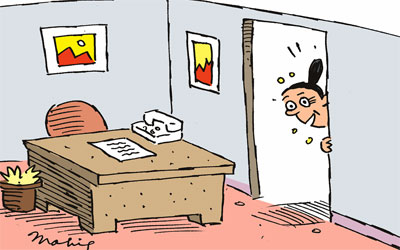|

by R. S. Karunaratne
Adjectival phrases with present participles
An adjectival phrase, unlike an adjectival clause, does not have a
finite verb and it does not begin with “who, which” or “that.”
It can begin with a non-finite verb such as a present
participle.These are the soldiers fighting the terrorists.
I like the clock hanging on the wall very much.

Rex is the man wearing a huge hat.
The man carried a huge bag containing clothes.
She looked at a monkey swinging by its tail.
An adjectival phrase, like an adjectival clause, comes immediately
after the noun it describes.
She stared at the stranger blocking the corridor.
The market was full of businessmen buying and selling vegetables.
Amanda waved to the tourists riding on an elephant.
Bernard photographed the lion sleeping in the cage.
I am the father of the boy sitting the examination.
When an adjectival phrase describes the subject of the sentence it
comes between the subject and the finite verb.
The watcher guarding the estate is my uncle.
The soldiers marching towards the battle field are fearless.
The girls dancing on the stage are Subashini’s students.
The dog sleeping on the doormat is a German Shepherd.
The youth planning to go abroad are university drop-outs.
[Activity]
Insert the correct word or words from the brackets in the blanks.
Check your answers with the key.
1. The school has 500 students .................. English. (studying
/ who study)
2. The company ..................... free books is based in Anuradhapura.
(that distribute / distributing)
3. The cashier deals efficiently with all matters ................. to
cash. (relating / which is relating)
4. Infants learning to walk ................. interesting to watch. (is
/ are)
5. The villagers greeted the tourists .................... them.
(visiting / were visiting)
6. Students following higher studies ...................... to learn
English. (has / have)
7. The pilgrims ................... the morning train got up early.
(catching / caught)
8. The company is looking for young people ............. Information
Technology. (learn / learning)
9. Mosquitoes ................. dengue breed in clean water. (spread /
spreading)
10. The police are rounding up people .................. in the streets.
(begging / begged)
Key:
1. studying 2. distributing 3. relating 4. is 5. visiting 6. have 7.
catching 8. learning 9. spreading 10. begging
Avoid circumlocution
Circumlocution simply means using a lot of words when a few will do.
Here’s a list of circumlocutory phrases found in some newspapers and
speeches.
Write the simple word or words against each circumlocutory phrase.
Check your answers with the key.
1. apart from the fact that: .......................
2. as a consequence of: ............................
3. as yet: .........................................
4. at the time of writing: .........................
5. at this moment: .................................
6. avail myself of the privilege: ..................
7. I am of the opinion that: .......................
8. I beg to differ: ................................
9. by virtue of the fact that: .....................
10. due to the fact that: ...........................
11. during the course of: ...........................
12. except for the fact that: .......................
13. few in number: ..................................
14. for the reason that: ............................
15. in accordance with: .............................
16. in addition to: .................................
17. in a majority of cases: .........................
18. in all probability: .............................
19. in anticipation of: .............................
20. in association with: ............................
21. in close proximity to: ..........................
22. in connection with: .............................
23. in consequence of: ..............................
24. in excess of: ...................................
25. in isolation: ...................................
26. in less than no time: ...........................
27. in many cases: ..................................
28. in order to: ....................................
29. in respect of: ..................................
30. in spite of the fact that: .....................
Key:
1. but or except,
2. because of,
3. yet,
4. now,
5. now,
6. accept,
7. I think,
8. I disagree,
9. because,
10. because,
11. during,
12. except,
13. few,
14. because,
15. under,
16. besides,
17. usually,
18. probably,
19. expecting,
20. with,
21. near,
22. about,
23. because of,
24. over,
25. alone,
26. soon,
27. often,
28. to,
29. about,
30. although
Starters:
The use of adverbs
Adverbs tell us how something happens or how somebody does something.
The bus stopped suddenly.
Krishanthi opened the window slowly.

The teacher wanted us to listen carefully.
Is it raining heavily?
Most adverbs are formed by adding “ly” to adjectives.
I’m going to tell you something important.
So, please listen to me carefully. (Adjective: careful)
We need your help quickly. (Adjective: quick)
I waited and somebody opened the door slowly. (Adjective: slow)
I understood everything perfectly. (Adjective: perfect)
The thief entered the house quietly. (Adjective: quiet)
The Indian team played badly. (Adjective: bad)
“Fast, hard, late” and “early” can be used as adjectives and adverbs.
Simon is a fast runner. (Adjective)
Simon ran fast. (Adverb)
The nurse’s job is very hard. (Adjective)
The nurse works very hard. (Adverb)
The train is late.(Adjective)
The train arrived late. (Adverb)
The early bird catches the worms. (Adjective)
She came early. (Adverb)
“Good” is an adjective.
The adverb is “well.”
He French is very good. (Adjective)
She speaks French very well. (adverb)
“Well” is also an adjective.
A: How are you?
B: I’m very well. Thank you.
[Activity]
Underline the right word. Check your answers with the key.
1. The students walked to school very slow / slowly.
2. Why are you angry / angrily with me?
3. Rob is a careful / carefully driver.
4. Read slow / slowly, then you will understand everything.
5. His teaching is very good / well.
6. Some students didn’t do well / good in the examination.
7. Sharon is studying hard / hardly for her examination.
8. The principal left school sudden / suddenly.
9. I can’t remember your name good / well.
10. Why are you eating your lunch so quick / quickly?
Key:
1. Slowly, 2. angry, 3. careful, 4. slowly, 5. good, 6. well, 7.
hard, 8. suddenly, 9. well, 10. quickly
Adjectives from nouns
It is useful to know how to build word families.
For a start, let’s make adjectives from nouns.
Write the relevant adjective against the following nouns. Check your
answers with the key.
[Nouns] [Adjective]
1. mixture ......................
2. modernization ...................
3. moment ......................
4. mood ......................
5. morality ......................
6. mother ......................
7. movement ......................
8. murder ......................
9. music ......................
10. name ......................
11. nation ......................
12. nature ......................
13. necessity ......................
14. need ......................
15. nerve ......................
16. noise ......................
17. normality ......................
18. north ......................
19. notice ......................
20. number ......................
21. obedience ......................
22. occasion ......................
23. offence ......................
24. office ......................
25. operation ......................
26. opposition ......................
27. option ......................
28. order ......................
29. organisation ......................
30. origin ......................
31. pack ......................
32. pain ......................
33. part ......................
34. patience ......................
35. payment ......................
36. peace ......................
37. perfection ......................
38. permission ......................
39. person ......................
40. persuasion ......................
Key:
1. mixed,
2. modern,
3. momentary,
4. moody,
5. moral,
6. motherly,
7. movable,
8. murderous,
9. musical,
10. named,
11. national,
12. natural,
13. necessary,
14. needy,
15. nervous,
16. noisy,
17. normal,
18. northern,
19. noticeable,
20. innumerable,
21. obedient,
22. occasional,
23. offensive,
24. official,
25. operational,
26. opposite,
27. optional,
28. orderly,
29. organised,
30. original,
31. packed,
32. painful,
33. partial,
34. patient,
35. unpaid,
36. peaceful,
37. perfect,
38. permissiblem,
39. personal,
40. persuasive |


